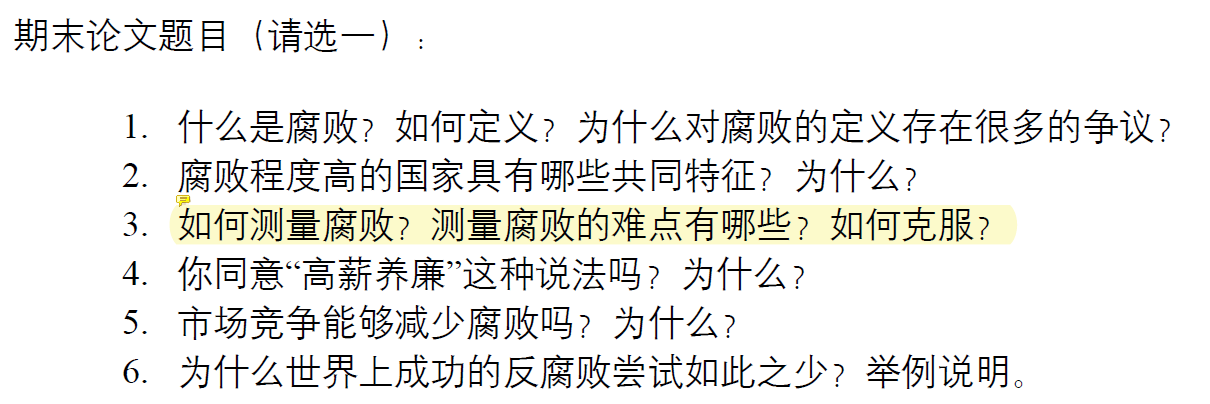廉洁治理导论
(公婷)SS1602024秋 2023秋2024秋 2023秋
9.0(4人评价)
- 课程难度
- 作业多少
- 给分好坏
- 收获大小
| 选课类别:文理通识 | 教学语言:双语 |
| 课程类别:社科类 | 开课单位:社会科学中心 |
| 课程层次:本科 | 获得学分:2.0 |
课程主页:暂无(如果你知道,请点右上角“编辑课程信息”添加!)
课程简介(教工部数据)
构建廉洁社会是人类的美好愿景,因为腐败问题长期困扰人类社会,对政府决策、经济发展、社会公平、政治稳定和司法正义造成负面影响。在当今世界上,包括联合国在内的国际组织和许多国家的政府为控制腐败作出种种努力。我国自改革开放以来坚持不懈地展开了廉洁治理。什么是廉洁治理?它包括哪些内容?控制腐败和廉洁治理的重要性、急迫性和复杂性何在?如何有效推进廉洁治理?什么是公民的廉洁义务?本课程将以全球比较的视角介绍腐败研究这门科学,帮助学生深入掌握廉洁治理相关的理论与实践,引导学生认识社会、了解世界,丰富社会科学知识,建立遵纪守法的廉洁观念。
Building a clean society is a beautiful vision for mankind because corruption has long plagued human society, adversely affecting government decision-making, economic development, social fairness, political stability, and judicial justice. In today's world, international organizations, including the United Nations, and many governments are making efforts to control corruption. Since the reform and opening up, China has unremittingly endeavored to pursue integrity governance. What does integrity governance mean? What is covered by integrity governance? Why is controlling corruption and clean governance important, urgent, and complex? How to effectively promote clean governance? Why is integrity a responsibility of citizens? This course will introduce corruption studies from a global comparative perspective and help students grasp theories and practices related to integrity governance, so that they can understand society and the world better, enrich social science knowledge, and establish law-abiding, ethical values.
点评写点评
排序学期
评分评分4条点评
评分评分4条点评
- 难度:中等
- 作业:中等
- 给分:一般
- 收获:一般
老师的原则是不支持加课。需要选社科课的同学如果积分选课阶段没能选上,建议寻找别的替代课程。
试听一节课,感觉老师讲的不错。
- 难度:中等
- 作业:中等
- 给分:一般
- 收获:一般
公婷老师是研究公共治理的专家,愿意去引导学生思考。但是课程的PPT很垃圾,期间有一次外出参观。一共一次pre,一个调查报告,一个期末报告。都认真完成了最终拿了A-,感觉不像前人描述的那么好
- 难度:简单
- 作业:中等
- 给分:超好
- 收获:很多
分数构成如下:
| Attendance*10% | Performance*10% | Analysis Report*30% | Debt*10% | Paper*40% |
签到会每节课严格签到,一般在第一节课的下课,不定时;课堂表现主要就是讨论的积极,但具体怎么计分是不太清楚的,建议还是给老师和助教混个脸熟,都是大学生上社科课了,各取所需呗^^;会有一个社会调查的报告,要求自己围绕本课主题自行选择一个重要且可行的研究题目;辩论要求3-4人一个小组,根据老师提供的辩题进行辩论,当然这个辩论不是传统意义上的辩论,还是一个pre汇报的形式,在最后全班对辩题进行讨论,不是很困难,即便自己的辩题不是很好讲老师也不会太为难你,“如果这些辩题能辩出个所以然,那就没必要辩论了,毕竟这些辩题都是学术界都比较头疼的问题,没有明确的答案。”,在整个过程还是能学到一些逻辑和思辨的知识的;最后的期末是以期末论文结束的,本学期有如下题目:

个人本来想选第三个的,后来发现论文和资料太少了就选了第六个,难度不是很大,但是好好写还是有点花时间的;老师是香港做研究的,本人对香港的文化非常感兴趣,因此上课还是颇有兴致的。整个课程不会很为难学生,想学到知识拓展眼界的也可以来,公婷老师人还是非常好的,能在她的课上感受到人文学者的那种气息。
- 难度:中等
- 作业:中等
- 给分:一般
- 收获:很多
1.难度
应该算是人文课里面比较难的课程,涉及到一些专业名词概念,认真听的话思维量较大
2.收获
如果对这方面感兴趣的收获很多,老师是研究反腐败非常资深有名的教授,但是如果不感兴趣的请慎选
3.给分
笨人认真对待后97,其他同学不清楚